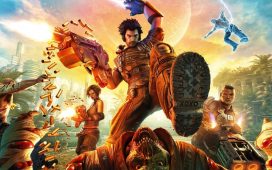‘I donate to the Guardian, so I’m paying you.” So begins Chet Faliszek as we sit down to lunch in one of the San Francisco hotels that satellite around the Game Developers Conference. One of the industry’s most respected comedy writers and lead developers, the 53-year-old is here to recruit developers to his new studio Stray Bombay, named after his pet cat Boris. With Riot Games veteran and AI expert Dr Kimberly Voll, he is leading a studio that will focus on smart cooperative video games, made for (they say) smart cooperative players.
It quickly becomes clear just how much cooperation has been a vital part of Faliszek’s life, from pivotal relationships growing up in Parma, Cleveland, to a comedy writing double-act at infamous early-internet website Old Man Murray, to his run of successful collaborations at a behemoth developer, Valve. With every key moment in his life, he cites the generosity of another person, a pattern which appears to have informed his entire approach to games development, and the sorts of games he wants to make.
At 17, in the early 80s, Faliszek had dropped out of a computer-science college course. “I was taking a course in [programming language] Fortran,” he explains, “and one time I tripped and dropped my punchcards. The printing thing that tells you what order they’re in didn’t print hard enough, and I didn’t know the order. So I dropped that class, dropped computer science, and failed out of school.” Instead, he attended a community college where he discovered theatre studies.
“I met a professor who introduced me to the theatre, Professor Stone.” He says the name with a reverent affection. “He challenged me about how to think about things. And when I embraced theatre, he created a theatre writing class for me.” It was always writing that Faliszek loved. “Growing up, I read a lot. I remember in sixth grade I was reading some Stephen King book, maybe Salem’s Lot, and asking my mom, ‘Does this guy make a living doing this?’ She said, ‘I think so?’ I decided that’s what I was going to do.”

An abortive attempt to move to work in theatre in New York was a profound early setback. Setting out to begin his career, he found himself on a $50-a-week internship on which it was impossible to survive. Returning to Cleveland, deflated and aimless, Faliszek worked as a painter, bartender and data processor before eventually starting a company with his good friend and future long-term writing partner, Erik Wolpaw. Chet and Erik, both now well-known in video games, had met through a mutual friend while Erik was still in high school. Chet remembers hanging out at someone’s house and getting along well; when I email Erik to ask how he remembers it, there came a tale of hacking groups, warez, and rumours of exploding cars.
Their company, which performed the thrilling job of checking businesses’ internal audits before they were sent to accountants, was incongruously named Murray & Sons. “Every other tech company was called ATX or some super-technical name,” says Faliszek, as if this is explanation enough. That, and they misremembered the name of the father in 60s sitcom My Three Sons as Murray (it was MacMurray). From there, the character of Old Man Murray was born.
Together they would spend a few years being the scourge of the games industry, writing a bitter, ferocious satirical site. Old Man Murray was the bad boy of early online games writing. Controversial, offensive, it talked about games with an irreverence not seen since the magazines of the 1980s. Routinely threatened with lawsuits, they were uncompromising in their treatment of the games industry, cruelly cutting to the bone in rude, often outright peculiar reviews and articles. Its most lingering legacy is likely its crate review system, which judged games based on how soon the player encountered their first in-game crate, or articles with titles like Alien Vs Child Predator. If you want evidence of its lasting effect, mention the site’s name to old-school developers such as American McGee and John Romero and watch their eyes twitch.

It was their collaborative comedy writing that attracted the attention of Faliszek’s next benevolent helper, Valve’s top boss Gabe Newell. “It was the summer before they released Half-Life 2. Gabe sent an email asking to meet, and we said, ‘Do we get more info?’ and he said, ‘No, just come on out.’” Did they hesitate? “Our only worry was that they might fire us for being incompetent. We made a pact that we would try it for six months, and if at that point they were still beating us up for being stupid and pitying us, we would just quit.” It was 12 years before they would move on.
While at Valve, despite being hired as a double-act, Faliszek and Wolpaw increasingly worked on separate projects. Chet took a strong interest in the dynamic speech-based storytelling in Left 4 Dead, while Erik began writing collaboratively with Jay Pinkerton on the linear sci-fi comedy Portal 2. They still occasionally worked on the same projects, but their different writing styles meant they were working better apart. Faliszek says there was never a difficult break-up. “He’s the funniest guy I know,” he says, with real passion. “Anything he produces gets a laugh out of me. And remember, at this point we’ve been friends for 35 years. You don’t stay friends for that long by staying so close to each other you’re never out of each other’s sight.”
It’s hard to overstate Valve’s impact on writing in video games. The developer’s reputation for immersive, ambitious storytelling was already firmly in place after Marc Laidlaw’s work on Half-Life and Half-Life 2, but with the arrival of Chet and Erik the studio took this to a new level. These games advanced the first-person shooter’s scale of ambition, and the writing made them engaging in a way still rarely seen in the genre.
Later Valve games Half-Life Episodes 1 and 2, Portal and Left 4 Dead were all phenomenally successful experiments with narrative complexity, with characters who reacted to what you did, rather than linear scripts. By Left 4 Dead, a four player co-op game, Faliszek was writing scripts that were entirely adaptable to the actions, surprises and events caused by players. Few other developers have even tried to replicate this feat, let alone equalled it, in the decade since Left 4 Dead 2’s release.
Leaving Valve was surely a big decision. After Left 4 Dead 2, Faliszek became one of the leading voices behind Valve’s virtual reality project, the HTC Vive. He enjoyed big pay, responsibility and a company that gave him full creative freedom. “There was nothing wrong with Valve,” he is keen to make clear. “Obviously they let me do what I want because I was making good choices. I’m smarter because of it, I’m a better person because of it, I learned so much from so many people. But during the release of the Vive, my father passed away. I turned 50 two weeks before that happened. It was the same year I got shingles. And I decided I wanted to be making games instead.”

His first move was a jump to Bossa Studios, creators of Surgeon Simulator and I Am Toast, to work on an unannounced project. It still hasn’t been announced, and here Faliszek hints at a slightly rougher departure. “It didn’t work out the way I hoped. After a year I said, ‘I don’t think we’re the right match’.” Faliszek had met Dr Kim Voll while working on the Vive, in a meeting with League of Legends developer Riot Games to discuss a VR project, and now remembered a discussion where they’d remarked how well they’d work together. “She’s a PhD in AI, and has an advanced degree in cognitive science … Enough degrees that I can’t remember all of them.” They shared the same interests and passions, celebrating players who enjoy working together, and the social impact of collaborative gaming.
“You’ve got to make your games for smart, social people,” he insists. As television audiences have matured with the medium, so have games players, argues Faliszek, to a point where gaming’s vocabularies are well enough understood to trust an audience with more complex, nuanced games. “They’ve become sophisticated, they know how to decipher systems. You’ve got to think about player behaviour from the very second you start. Because that informs how you tell a story.”
Multiplayer games are not legendary for their stories. Faliszek’s Left 4 Dead and its sequel were certainly exceptions, its cast of characters explored through dynamic dialogue. Faliszek and Voll now want to take that further, introducing game world stories that progress independently of the players alongside Left 4 Dead’s depth of characterisation, both impacting upon the other. “You want to have that moment where you wonder how this [character] is going to react to what’s going on.”
Faliszek is incredibly optimistic about video games and the people who play them. He is certain that collaborative play brings out the best in people, and intends to develop games designed for it. “The games industry,” he firmly maintains, “is filled with both players and developers who are awesome, smart, fun and friendly.” When cooperation has proven such a vital recurring theme in the most significant moments of his life, perhaps you can’t blame him for thinking so.














